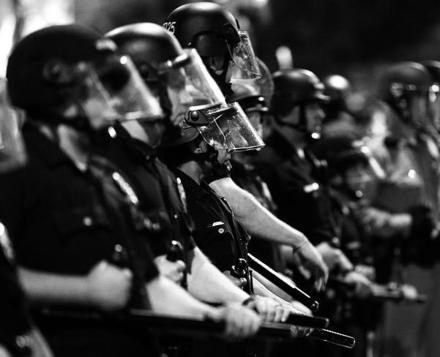Brendan Mullen threw a big St. Patrick's Day benefit for his groundbreaking Hollywood punk club, the Masque. The Los Angeles Police were not invited, but they crashed the party. Literally.
Many have told their stories of the disgusting events surrounding that night (see links below), and on the occasion of the 41st anniversary, I'm adding mine.
I got to the MacArthur Park neighborhood early, traveling solo from my Hollywood apartment by bus, and walked up the wide carpeted staircase of the impressive old stone Elks Hall. The concert was in a large auditorium on the second floor.
The Wipers opened, and I liked the Portland band's big, churning chords but didn't think there was much punk about them. The Zeros followed, and they were good enough songwriters to make a poppish impression too, but always brought a ton of chaotic energy -- great band. And the audience, 600 strong by some reports, was moshing up a storm.
I strolled outside to catch the evening air, made a circuit around the block and got scared. Every foot of the streets was taken up by black-and-white LAPD vehicles, mostly double-parked; there must have been at least 30. All was quiet, though. I went back inside.
The Go-Go's, still with their pre-fame lineup, played a rambunctiously raw set. The wonderful Plugz ripped through dynamic proto-punk made for pogoing, but after a few songs, someone interrupted them, coming to the microphone to announce that the show had been stopped by the cops and we would all have to leave. I don't remember who was privileged to deliver the news, but I don't think it was Brendan. Maybe the hall manager.
So the Alley Cats and X never played. The black-clad and spike-haired audience grumbled and moved out, very slowly. One of the last to leave, I watched as police herded the crowd to the exit. One punk wasn't budging, and from his slouched seated posture it appeared that he was passed out from St. Patrick's cheer. Two cops prodded him, and when he didn't rise, one of them struck him with a baton on the head and shoulder; they picked him up and dragged him out. Others reported similar instances of brutality outside that I didn't see.
As I left with the stragglers, a stunning spectacle came into view: The staircase was lined on both sides with cops in full riot gear -- helmets, visors, shields. And guns, of course. More than 50 cops inside, and as many more outside. I dawdled down the steps, taking time to look into each cop's eyes, which they plainly did not appreciate. Stupid; I was lucky to escape with my scalp.
Now comes the fun part. Not seeing anything about the crackdown in the newspapers, and unable to reach Brendan (it turned out that he hosted a punk community meeting the next day), I decided to make a formal complaint at the LAPD's Rampart Division, which had staged the shutdown and which had accumulated decades of repute as the most violent and corrupt police division west of the Mississippi.
Some background. The police were no strangers to punk events. Over the previous year, they had been called to many bars and clubs that experimented with punk bookings, where the proprietors had been rewarded with broken glassware, chairs, tables and railings via unruly crowds. Every club in Los Angeles eventually established a no-punk policy, and whenever punk bands managed to rent a hall, the men in blue were likely to make their presence felt. Bands told audiences to cool it, and they didn't, so suppression by The Man was a natural consequence.
But the cops made the Elks Lodge concert a special target. Under the pretext that one person had thrown a bottle outside the venue, they mobilized a riot force appropriate to a major uprising. This was clearly pre-planned. I saw no misbehavior or broken glass in my walk around the block. The story I heard was that the bottle thrower had fled inside the hall and mingled with a Mexican wedding party on the same floor as the punk show. The punk show was evacuated; the wedding was not.
The police overreaction, intimidation and violence inspired my Rampart visit. I went into the police station and told the officer at the desk that I wanted to make a complaint. He told me to take a seat. He went to the back, leaving the desk vacant. I waited 20 minutes, then went back up and rapped on the desk. Nothing. I rapped again, and a different cop came out and asked what I wanted. I told him I wanted to file a complaint about the Elks Hall activities. He said, "We don't take those here."
I went home and typed a letter to Mayor Tom Bradley (himself a former LAPD officer), outlining the outrage and reporting what the cop had told me. I considered this no more than a venting exercise.
A couple of weeks later, though, I got a call from LAPD, saying the police wanted to take my statement. Two plainclothes cops and one uniformed officer came to my tiny apartment with a tape recorder. One plainclothes told me the LAPD had received my letter; the uniformed cop glared at me and grunted that it was "pretty strong stuff." I wished I had made a copy.
The cops artfully attempted to minimize my testimony, asking how far I was from the beatdown, if I had seen blood (no), if I knew any other witnesses (not at the time), and if I was personally accosted. They did not address the appropriateness of 100 officers responding to a thrown bottle, but said Robert Hilburn of L.A. Times would be writing a story in the next few days. The Times never published a word, though attendee and Times stringer Kristine McKenna tells me she pitched it. The LAPD never offered an explanation. The end.
* * *
Here are some other writings on the subject.

